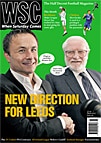 Jonathan Wilson examines how Guus Hiddink, a potential Blues boss, is faring with Russia
Jonathan Wilson examines how Guus Hiddink, a potential Blues boss, is faring with Russia
A surge of popular excitement, a couple of iffy results followed by a couple of good performances, and the Russian attitude to Guus Hiddink is still largely positive. Were he to leave for Chelsea, there would be disappointment and anger, but the Russian sports pages haven’t exactly been buzzing with warnings of his imminent departure. Partly because there is no Russian Mark Palios ready to build a wall of cash to keep his manager in situ, but also because no one thinks a move to Chelsea is that probable.
It is generally accepted that Roman Abramovich contributes to the Dutchman’s salary – as ever in Russia, everything even vaguely official is smothered in secrecy, but Hiddink’s arrival was brokered by Vitaly Mutko, a politician-turned-football-administrator and an Abramovich crony. Still, local journalists find the western obsession with the Chelsea owner almost comical. When a question was asked about Abramovich at the press conference to present Hiddink, it prompted a ripple of laughter. That is not necessarily conclusive, but it is revealing. Hiddink, after all, has been in charge for only four competitive games and his past record suggests that he is a man who, if at all possible, likes to complete the job he has started.
When Hiddink first visited Moscow he was greeted like a film star, dogged by fans and photographers, something unprecedented for a manager in Russia. There was some dissent, although mainly from those who had done the job in the past for far, far less. “I strongly believe that being just a good coach is not enough to lead our national team,” said Valeriy Gazzayev. “You must be a real patriot, thoroughly understand our national identity, character and traditions, and for that you must be born here.”
Players were less concerned. “It’s been a long time since we achieved anything worthwhile,” said the Spartak midfielder Yegor Titov. “We’re all starving for success and if Hiddink holds the key to our future then it doesn’t really matter if he is Dutch, French or Italian. He is our coach.” Titov was promptly omitted from Hiddink’s first match, but has since returned to the fold.
After home draws against Croatia and Israel in Russia’s first two Euro 2008 qualifiers, there is a sense that Hiddink is settling in. A handful of questionable early selections – evidence of his lack of knowledge of the Russian game, said his critics – have been discarded and Russia are beginning to demonstrate the typical Hiddink trait of tactical flexibility.
A bold substitution rescued a 2-0 win from the home game against Estonia just as it seemed to be heading for a draw. Then came a performance of real quality in Macedonia. Hiddink deployed seven attacking players in a 3‑5‑2 and was rewarded with a comprehensive 2‑0 victory. Even more pleasingly for the manager, the first goal was scored by the Spartak winger Vladimir Bystrov, a player he had brought into the squad. “There could be three, four or even two defenders,” Hiddink said, “but in fact the main thing is not in the numbers, but in the way the team defends, attacks, how the transition from defence to attack is organised and vice versa. To sum it up, it is the way the players interact between each other.”
There is also a sense that the national team is fun. Players may discuss club issues only on the first day of training, while swearing in English is encouraged. In a country in which the po-faced Lev Yashin remains the supreme football icon, this is radical. With an away game in Estonia followed by home matches against Andorra and Macedonia, even allowing for the trip to Croatia, Russia could have built up real momentum before they arrive in England in September.
Still, when Abramovich is in charge, being successful and popular with the players doesn’t necessarily indicate stability.
From WSC 241 March 2007. What was happening this month